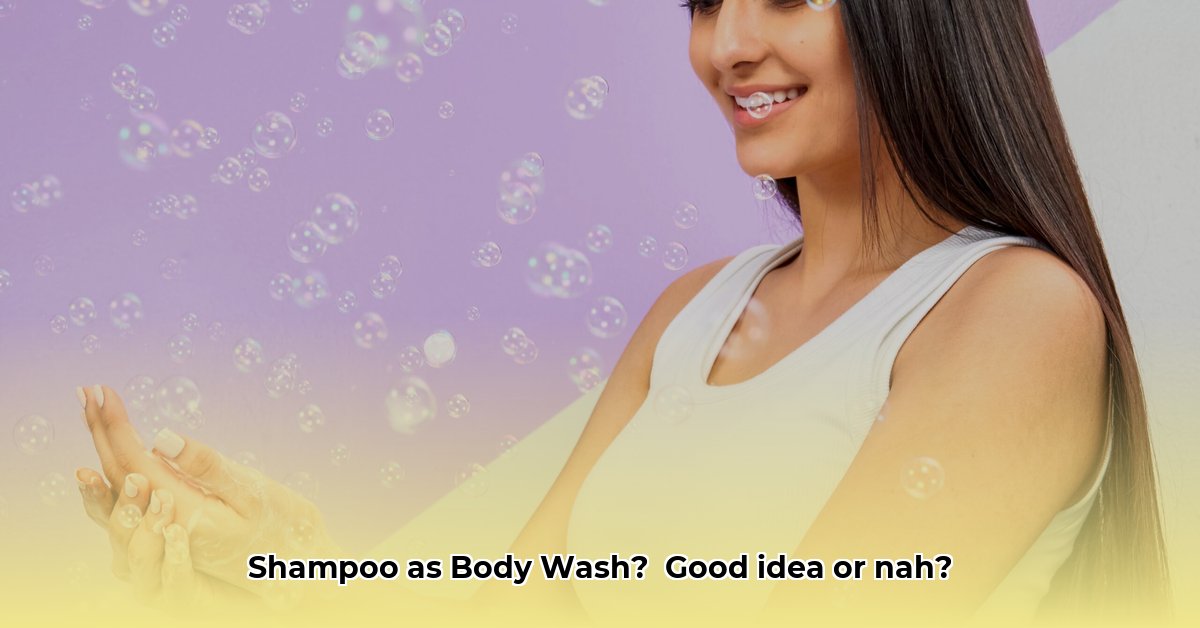The Shower Quandary: Shampoo vs. Body Wash
We’ve all been there – staring at that shampoo bottle in a body-wash-less shower, wondering, “Can I just this once…?” In a pinch, yes, shampoo can work. But should it become your regular routine? Probably not. Let’s explore why.
Why Shampoo Isn’t Ideal for Your Skin
Shampoo is designed for your hair – a delicate fiber that needs gentle cleansing. Your skin, however, faces daily battles with sweat, dirt, and grime. Body wash, with its robust cleansers, is formulated for this heavy lifting. Think of it this way: you wouldn’t wash delicate silk with laundry detergent.
Shampoo’s milder surfactants don’t lather as much, which likely means your skin won’t get truly clean. Repeated shampoo use can also disrupt your skin’s pH balance, potentially leading to dryness, irritation, and breakouts. It’s like disrupting a delicate rainforest ecosystem – the balance is crucial. Shampoo can strip away your skin’s protective oils, leaving it vulnerable.
Why Body Wash Is a Hair Horror Story
Conversely, using body wash on your hair is like using a pressure washer on a delicate flower. The harsh detergents strip away essential oils, leaving your hair dry, brittle, and lifeless. This can also disrupt your scalp’s pH, potentially leading to dandruff.
The pH Puzzle: A Balancing Act
pH, the measure of acidity or alkalinity, is a key player in this cleansing conundrum. Your skin thrives in a slightly acidic environment, while your hair prefers things a bit more alkaline. Shampoo, designed for hair’s higher pH, can disrupt your skin’s delicate balance, weakening its protective barrier.
The Two-in-One Trap: Jack of All Trades, Master of None
Two-in-one products might seem convenient, but they often compromise on effectiveness. Like trying to be a world-class chef and a concert pianist, excelling at both is a challenge. These formulas often contain a blend of ingredients that aren’t ideal for either hair or skin.
Better Alternatives to the Shampoo-Body Wash Swap
In a true emergency, shampoo can work. But for everyday cleansing, stick to what’s designed for the job. If you’re out of body wash, a gentle face wash is a much better alternative.
| Feature | Pros | Cons |
|---|---|---|
| Availability | Usually readily available | Not designed for skin’s needs |
| Cost | Can save money in an emergency | Can lead to dryness, irritation, and breakouts |
| Convenience | Handy in emergencies | Less effective cleansing than purpose-built body wash |
- Buy body wash: This is the simplest, most effective, and best option for your skin!
- Use face wash: A gentler alternative to shampoo in a pinch.
- Consider natural cleansing bars: Some gentle bars can be suitable for both body and hair.
Treat your skin with the respect it deserves. Using the right cleanser makes a real difference in its long-term health and happiness.
The Science of Suds: A Deeper Dive into Shampoo and Body Wash
Let’s explore why choosing the right cleanser matters, delving into the science behind those sudsy formulas.
pH: The Balancing Act for Hair and Skin
pH, the measure of acidity and alkalinity, is crucial for healthy hair and skin. Think Goldilocks – not too acidic, not too alkaline, but just right. And “just right” differs for hair and skin.
Shampoo, typically slightly acidic (pH 6-7), smooths the hair cuticle (the outer layer), enhancing shine and manageability. Body wash, slightly alkaline (pH 8-10), maintains the skin’s acid mantle – a protective layer against bacteria and irritants.
Regularly using the wrong product can disrupt this balance. Shampoo on skin can strip natural oils, causing dryness and irritation. Body wash on hair may leave residue, making it greasy. Some experts believe that pH disruption can exacerbate existing skin conditions like eczema.
Surfactants: The Cleaning Crew
Surfactants, or surface-active agents, are the cleaning powerhouses in both shampoo and body wash. They allow water and oil to mix, enabling dirt removal. However, the types and concentrations of surfactants differ.
Shampoo often contains strong surfactants like sodium lauryl sulfate (SLS) to tackle scalp oils and product buildup. Body wash uses milder surfactants like cocamidopropyl betaine for gentle cleansing without stripping essential moisture.
| Feature | Shampoo | Body Wash |
|---|---|---|
| Surfactants | Strong, high concentration (e.g., SLS, SLES) | Mild, lower concentration (e.g., cocamidopropyl betaine) |
| pH | More acidic, designed to break down scalp oils | Closer to skin’s natural pH (slightly acidic to neutral) |
| Purpose | Remove oil and product build-up from hair | Cleanse skin gently, maintain moisture balance |
| Potential Effects on Skin | May cause dryness, irritation, disrupt pH balance with regular use | Gently cleanses, maintains skin’s natural barrier |
While occasional shampoo use on your body likely won’t cause lasting harm, especially if you have normal-to-oily skin, making it a habit can dry out your skin, particularly if you have dry or sensitive skin. Current research suggests this is due to both the stronger surfactants and the difference in pH between shampoo and body wash. Choosing a body wash with mild surfactants and a pH balanced for skin is a smart move for healthy skin.
Choosing the right cleanser respects your skin’s delicate ecosystem. Treat your skin to the gentle care it deserves.
- Top Rated Meditation Books to Deepen Your Practice - February 5, 2026
- Good Mindfulness Books For A Calmer, Happier Everyday Life - February 4, 2026
- Recommended Meditation Books for Beginners and Experienced Practitioners - February 3, 2026
















